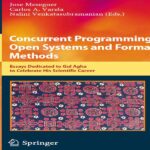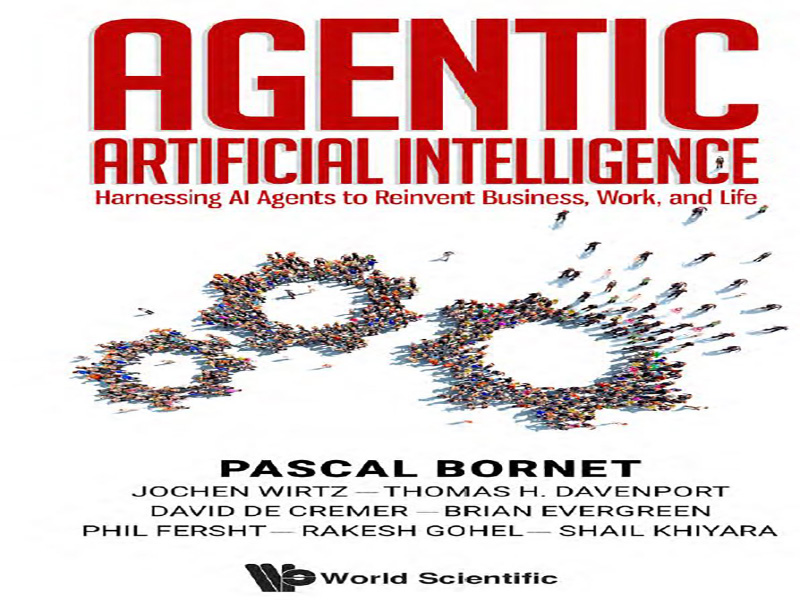- عنوان کتاب: Agentic Artificial Intelligence -Harnessing AI Agents to Reinvent Business, Work, and Life
- نویسنده: Pascal Bornet, Jochen Wirtz
- حوزه: عامل هوش مصنوعی
- سال انتشار: 2025
- تعداد صفحه: 561
- زبان اصلی: انگلیسی
- نوع فایل: pdf
- حجم فایل: 5.25 مگابایت
یک تحول عمیق در نحوه کار، زندگی و ایجاد ارزش ما در حال وقوع است. در حالی که بسیاری این را یک انقلاب صرفاً تکنولوژیکی میدانند، ما چیزی بسیار معنادارتر میبینیم: فرصتی برای تعریف مجدد رابطه بین انسانها و ماشینها به روشهایی که آنچه ما را به طور منحصر به فرد انسان میکند را تقویت کند. ما یک تیم متنوع از بیست و هفت متخصص در حوزههای کسب و کار، دانشگاه، برنامهنویسی و تحقیق هستیم که با یک دیدگاه مشترک در مورد چگونگی خدمت فناوری به بشریت متحد شدهایم. پیشینه ما از پیادهسازی سیستمهای اتوماسیون در مقیاس سازمانی گرفته تا تحقیقات پیشگامانه در هوش مصنوعی، مشاوره با شرکتهای فورچون ۵۰۰ و مطالعه پیامدهای اجتماعی تغییرات تکنولوژیکی متغیر است. آنچه ما را گرد هم میآورد فقط تخصص ما نیست – بلکه باور مشترک ما این است که فناوری باید پتانسیل انسان را افزایش دهد نه اینکه جایگزین آن شود. سفر ما به این کتاب سالها پیش آغاز شد، اگرچه در آن زمان نمیدانستیم. بسیاری از ما جزو اولین کسانی بودیم که سیستمهای اتوماسیون هوشمند را در سازمانهای بزرگ در سراسر جهان پیادهسازی کردیم. ما در رویکردهایی برای ترکیب هوش مصنوعی با اتوماسیون فرآیند رباتیک (RPA) پیشگام بودیم و سیستمهایی ایجاد کردیم که میتوانستند فرآیندهای تجاری پیچیده و رو به رشد را مدیریت کنند. این کار باعث شد برخی از ما در سال ۲۰۲۰ در نوشتن کتاب «اتوماسیون هوشمند» مشارکت کنیم، کتابی که به یک کتاب پرفروش جهانی تبدیل شد و به سازمانها کمک کرد تا رویکرد خود را به تحول دیجیتال بازنگری کنند. ما در آن زمان متوجه نبودیم که در حال پایهگذاری چیزی حتی دگرگونکنندهتر هستیم. سیستمهای اتوماسیون هوشمندی که ما در طول پانزده سال گذشته ساختهایم – که اتوماسیون فرآیند را با هوش مصنوعی برای مدیریت گردشهای کاری ساختاریافته ترکیب میکنند – به پایه و اساس سیستمهای عامل امروزی تبدیل شدهاند. این پیشرفت کاملاً منطقی است: قبل از اینکه یک سیستم بتواند به صورت مستقل عمل کند (همانطور که عاملها انجام میدهند)، باید بر اصول اولیه اجرای فرآیندها، مدیریت دادهها و تصمیمگیری در پارامترهای تعریفشده تسلط داشته باشد. اینها دقیقاً همان قابلیتهایی هستند که ما سالها صرف پالایش آنها در سیستمهای اتوماسیون هوشمند کردهایم. این پایه و اساس، زمانی که آخرین پیشرفتها در هوش مصنوعی مولد، دری را به روی سیستمهای عامل مدرن گشود، به ما یک مزیت منحصر به فرد داد. ما قبلاً در بسیاری از چالشهای اساسی تجربه کسب کرده بودیم: چگونه فرآیندهای پیچیده را به طور قابل اعتمادی خودکار کنیم، چگونه استثنائات را به طرز شایستهای مدیریت کنیم، چگونه با سیستمهای موجود ادغام شویم و از همه مهمتر، چگونه این فناوریها را به روشهایی پیادهسازی کنیم که به جای جایگزینی، قابلیتهای انسانی را افزایش دهند. وقتی شرکتها چند سال پیش شروع به کاوش در سیستمهای عاملدار کردند، بسیاری از آنها به طور طبیعی از پلتفرمهای اتوماسیون هوشمند موجود خود تکامل یافتند و بر اساس این مبانی اثباتشده، قابلیتهای پیچیدهتر و خودمختارتری ایجاد کردند.
There’s a profound transformation happening in how we work, live, and create value. While many see this as a purely technological revolution, we see something far more meaningful: an opportunity to redefine the relationship between humans and machines in ways that amplify what makes us uniquely human. We are a diverse team of twenty-seven professionals spanning business, academia, programming, and research, united by a shared vision of how technology can serve humanity. Our backgrounds range from implementing enterprise-scale automation systems to pioneering research in artificial intelligence, consulting with Fortune 500 companies, and studying the societal implications of technological change. What brings us together isn’t just our expertise—it’s our shared belief that technology should enhance human potential rather than replace it. Our journey to this book began years ago, though we didn’t know it at the time. Many of us were among the first to implement intelligent automation systems in major organizations worldwide. We pioneered approaches to combine artificial intelligence with robotic process automation (RPA), creating systems that could handle increasingly complex end-to-end business processes. This work led some of us to co-author Intelligent Automation in 2020,1 which became a global bestseller and helped organizations rethink their approach to digital transformation. We didn’t realize then that we were laying the groundwork for something even more transformative. The intelligent automation systems we built over the past fifteen years—which combine process automation with artificial intelligence to handle structured workflows—have become the foundation for today’s agentic systems. The progression makes perfect sense: before a system can act autonomously (as agents do), it needs to master the basics of executing processes, handling data, and making decisions within defined parameters. These are exactly the capabilities we’ve spent years refining in intelligent automation systems. This foundation gave us a unique advantage when the latest breakthroughs in generative AI opened the door to modern agentic systems. We had already gained experience with many of the fundamental challenges: how to reliably automate complex processes, how to handle exceptions gracefully, how to integrate with existing systems, and most importantly, how to implement these technologies in ways that enhance rather than replace human capabilities. When companies began exploring agentic systems a few years ago, many naturally evolved from their existing intelligent automation platforms, building upon these proven foundations to create more sophisticated, autonomous capabilities.
این کتاب را میتوانید از لینک زیر بصورت رایگان دانلود کنید:
Download: Agentic Artificial Intelligence





































نظرات کاربران